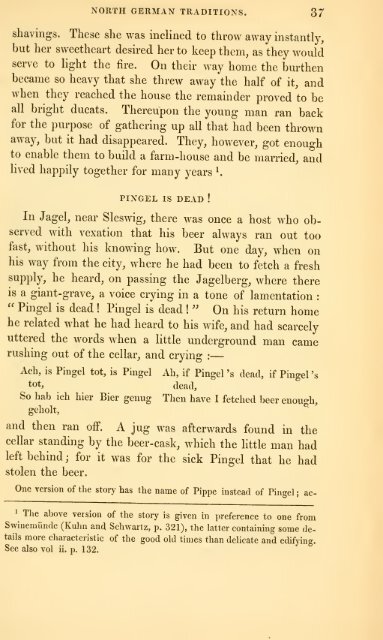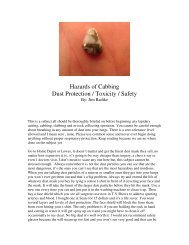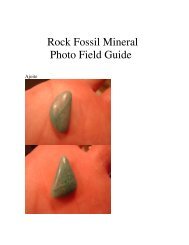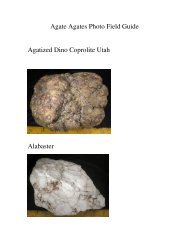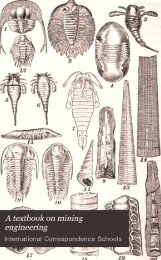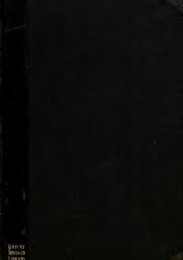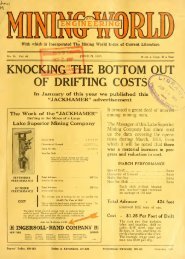- Page 2: o
- Page 8 and 9: PRINTED BY RICHARD TAYLOR, RED MOX
- Page 10 and 11: ' IV CONTENTS. The Devil's Cat Mono
- Page 12 and 13: VI CONTENTS. Page A Horse comes out
- Page 14 and 15: Vlll CONTENTS. Page Kludde 193 Ossc
- Page 16 and 17: X CONTENTS. Page Falkenberg ^^^ The
- Page 18 and 19: xNOKTH GERMAN TRADITIONS. cini lUMi
- Page 20 and 21: NORTH GERMAN TRADITIONS. Two yoiiii
- Page 22 and 23: O NORTH GERMAN TRADITIONS. there we
- Page 24 and 25: ; -; 8 NORTH GERMAN TRADITIONS. our
- Page 26 and 27: — 10 NORTH GERMAN TRADITIONS. men
- Page 28 and 29: 1.2 NORTH GERMAN TRADITIONS. Alvers
- Page 30 and 31: 14 NORTH GERMAN TRADITIONS. when in
- Page 32 and 33: 16 NORTH GERMAN TRADITIONS. There w
- Page 34 and 35: 18 NORTH GERMAN TRADITIONS. ; order
- Page 36 and 37: ^0 NORTH GERMAN TRADITION'S. ; (lay
- Page 38 and 39: 22 NORTH GERMAN TRADITIONS. traces
- Page 40 and 41: 24 NORTH GERMAN TRADITIONS. but no
- Page 42 and 43: 26 NORTH GERMAN TRADITIONS. THE SEV
- Page 44 and 45: 28 NORTH GERMAN TRADITIONS. ; Apenr
- Page 46 and 47: 30 NORTH GERMAN TRADITIONS. When a
- Page 48 and 49: 32 NORTH GERMAN TRADITIONS. : They
- Page 50 and 51: 34 NORTH GERMAN TRADITIONS. the sub
- Page 54 and 55: 38 NORTH GERMAN TRADITIONS. cording
- Page 56 and 57: 40 NORTH GERMAN TRADITIONS. sadness
- Page 58 and 59: : 42 NORTH GERMAN TRADITIONS. a woo
- Page 60 and 61: 44 NORTH GERMAN TRADITIONS. cradle,
- Page 62 and 63: 46 NORTH GERMAN TRADITIONS. THE KIE
- Page 64 and 65: 48 NORTH GERMAN TRADITIONS. man not
- Page 66 and 67: 50 NORTH GERMAN TRADITIONS. may be
- Page 68 and 69: ; 52 NORTH GERMAN TRADITIONS. may b
- Page 70 and 71: 54 NORTH GERMAN TRADITIONS. found a
- Page 72 and 73: : 56 NORTH GERMAN TRADITIONS. from
- Page 74 and 75: 58 NORTH GERMAN TRADITlOXSv When ju
- Page 76 and 77: 60 NORTH GERMAN TRADITIONS. the hou
- Page 78 and 79: 62 NORTH GERMAN TRADITIONS. round t
- Page 80 and 81: 64 NORTH GERMAN TRADITIONS. For whe
- Page 82 and 83: ; G6 NORTH GERMAN TRADITIONS. be va
- Page 84 and 85: 68 NORTH GERMAN TRADITIONS. running
- Page 86 and 87: 70 NORTH GERMAN TRADITIONS. thing w
- Page 89 and 90: NORTH GERMAN POPULAR TRADITIONS. 11
- Page 91 and 92: ! NORTH GERMAN TRADITIONS. 75 somet
- Page 93 and 94: NORTH GERMAN TRADITIONS. 7/ liad a
- Page 95 and 96: NORTH GERMAN TRADITIONS. 79 wives.
- Page 97 and 98: NORTH GERMAN TRxVDITIONS. 81 driven
- Page 99 and 100: NORTH GERMAN TRADITIONS. 83 them^ T
- Page 101 and 102: NORTH GERMAN TRADITIONS. 85 them, c
- Page 103 and 104:
NORTH GERMAN TRADITIOiNS. 87 FRAU H
- Page 105 and 106:
NORTH GERMAN TRADITIONS. 89 gave it
- Page 107 and 108:
NORTH GERMAN TRADITIONS. 91 ! ^ Whi
- Page 109 and 110:
NORTH GERMAN TRADITIONS. 93 then ca
- Page 111 and 112:
NORTH GERMAN TRADITIONS. 95 ; The i
- Page 113 and 114:
NORTH GERMAN TRADITIONS. 97 THE DEM
- Page 115 and 116:
NORTH GERMAN TRADITIONS. 99 and fal
- Page 117 and 118:
NORTH GERMAN TRADITIONS. 101 TRADIT
- Page 119 and 120:
NORTH GERMAN TRADITIONS. 103 THE SM
- Page 121 and 122:
NORTH GERMAN TRADITIONS. 105 beatin
- Page 123 and 124:
NORTH GERMAN TRADITIONS. 107 moreov
- Page 125 and 126:
NORTH GERMAN TRADITIONS. 109 A dwar
- Page 127 and 128:
NORTH GERMAN TRADITIONS. Ill ; unab
- Page 129 and 130:
NORTH GERMAN TRADITIONS. 113 beard
- Page 131 and 132:
NORTH GERMAN TRADITIONS. 115 grey.
- Page 133 and 134:
NORTH GERMAN TRADITIONS. 117 ; Hiib
- Page 135 and 136:
NORTH GERMAN TRADITIONS. 1 19 THE C
- Page 137 and 138:
NORTH GERMAN TRADITIONS. 121 ; bird
- Page 139 and 140:
NORTH GERMAN TRADITIONS. 123 for th
- Page 141 and 142:
NORTH GERMAN TRADITIONS. 125 sat on
- Page 143 and 144:
seen. NORTH GERMAN TRADITIOXS. 127
- Page 145 and 146:
; NORTH GERMAN TRADITIONS. 129 rule
- Page 147 and 148:
NORTH GERMAN TRADITIONS. 131 THE CU
- Page 149 and 150:
NORTH GERMAN CUSTOMS AND SUPERSTITI
- Page 151 and 152:
NORTH GERMAN CUSTOMS AND SUPERSTITI
- Page 153 and 154:
NORTH GERMAN CUSTOMS AND SUPERSTITI
- Page 155 and 156:
NORTH GERMAN CUSTOMS AND SUPERSTITI
- Page 157 and 158:
. NORTH GERMAN CUSTOMS AND SUPERSTI
- Page 159 and 160:
: ; NORTH GERMAN CUSTOMS AND SUPERS
- Page 161 and 162:
NORTH GERMAN CUSTOMS AND SUPERSTITI
- Page 163 and 164:
NORTH GERMAN CUSTOMS AND SUPERSTITI
- Page 165 and 166:
NORTH GER3IAN CUSTOMS AND SUPERSTIT
- Page 167 and 168:
; NORTH GERMAN CUSTOMS AND SUPERSTI
- Page 169 and 170:
NORTH GERMAN CUSTOMS AND SUPERSTITI
- Page 171 and 172:
NORTH GEHMAN CUSTOMS AND SUrERSTlTI
- Page 173 and 174:
. NORTH GERMAN CUSTOMS AND SUPERSTI
- Page 175 and 176:
: ; NORTH GERMAN CUSTOMS AND SUPERS
- Page 177 and 178:
NORTH GERMAN CUSTOMS AND SUPERSTITI
- Page 179 and 180:
NORTH GERMAN CUSTOMS AND SUPERSTITI
- Page 181 and 182:
: . ' NORTH fiERMAN CUSTOMS AND SUP
- Page 183 and 184:
NORTH GERMAN CUSTOMS AND SUPERSTITI
- Page 185 and 186:
: NORTH GERMAN CUSTOMS AND SUPERSTI
- Page 187 and 188:
; ; NORTH GERMAN CUSTOMS AND SUPERS
- Page 189 and 190:
; NORTH GERMAN CUSTOMS AND SUPERSTI
- Page 191 and 192:
NORTH GERMAN CUSTOMS AND SUPERSTITI
- Page 193 and 194:
; NORTH GERMAN CUSTOMS AND SUPERSTI
- Page 195 and 196:
: NORTH GERMAN CUSTOMS AND SUPERSTI
- Page 197 and 198:
— : NORTH GERMAN CUSTOMS AND SUPE
- Page 199 and 200:
NORTH GERMAN CUSTOMS AND SUPERSTITI
- Page 201 and 202:
NORTH GERMAN CUSTOMS AND SUPERSTITI
- Page 203 and 204:
NETHERLANDISH POPULAR TRADITIONS KA
- Page 205 and 206:
NETHERLANDISH TRADITIONS. 189 over,
- Page 207 and 208:
NETHERLANDISH TRADITIONS. 191 out a
- Page 209 and 210:
NETHERLANDISH TRADITIONS. 193 drink
- Page 211 and 212:
NETHERLANDISH TRADITIONS. 195 the y
- Page 213 and 214:
NETHERLANDISH TRADITIONS. 197 to cr
- Page 215 and 216:
NETHERLANDISH TRADITIONS. 199 were
- Page 217 and 218:
: NETHERLANDISH TRADITIONS. 201 The
- Page 219 and 220:
NETHERLANDISH TRADITIONS. 203 mouth
- Page 221 and 222:
NETHERLANDISH TRADITIONS. 205 the o
- Page 223 and 224:
NETHERLANDISH TRADITIONS. 207 darte
- Page 225 and 226:
NETHERLANDISH TRADITIONS. 209 kill
- Page 227 and 228:
NETHERLANDISH TRADITIONS. 211 Wappe
- Page 229 and 230:
NETHERLANDISH TRADITIONS. 213 worki
- Page 231 and 232:
NETHERLANDISH TRADITIONS. 215 havin
- Page 233 and 234:
" NETHERLANDISH TRADITIONS. 217 his
- Page 235 and 236:
NETHERLANDISH TRADITIONS. 219 : her
- Page 237 and 238:
XETHERLANDISH TRADITIONS. 221 ; Ypr
- Page 239 and 240:
NETHERLANDISH TRADITIONS. 223 well-
- Page 241 and 242:
: NETHERLANDISH TRADITIONS. 225 hig
- Page 243 and 244:
; NETHERLANDISH TRADITIONS. 227 clo
- Page 245 and 246:
— NETHERLANDISH TRADITIONS. 229 g
- Page 247 and 248:
NETHERLANDISH TRADITIONS. 231 now t
- Page 249 and 250:
NETHERLANDISH TRADITIONS. 233 empti
- Page 251 and 252:
NETHERLANDISH TRADITIONS. 235 RIDIN
- Page 253 and 254:
XETHERLANDISII TRADITIONS. 237 said
- Page 255 and 256:
NETHERLANDISH TRADITIONS. 239 and r
- Page 257 and 258:
NETHERLANDISH TRADITIONS. 241 She w
- Page 259 and 260:
NETHERLANDISH TRADITIONS. 243 throu
- Page 261 and 262:
NETHERLANDISH TRADITIONS. 245 Out o
- Page 263 and 264:
NETHERLANDISH TRADITIONS. 247 had v
- Page 265 and 266:
: NETHERLANDISH TRADITIONS. 249 God
- Page 267 and 268:
NETHERLANDISH TRADITIONS. 251 duall
- Page 269 and 270:
NETHERLANDISH TRADITIONS. 253 On th
- Page 271 and 272:
NETHERLANDISH TRADITIONS. 255 emitt
- Page 273 and 274:
NETHERLANDISH TRADITIONS. 257 with
- Page 275 and 276:
: NETHERLANDISH TRADITIONS. 259 ing
- Page 277 and 278:
NETHERLANDISH TRADITIONS. 261 ; her
- Page 279 and 280:
NETHERLANDISH TRADITIONS. 263 THE D
- Page 281 and 282:
NETHERLANDISH TRADITIONS. 265 ; WAN
- Page 283 and 284:
NETHERLANDISH TRADITIONS. 267 you i
- Page 285 and 286:
NETHERLANDISH TRADITIONS. 269 COWLS
- Page 287:
NETHERLANDISH TRADITIONS. 271 annou
- Page 290 and 291:
: 27i NETHERLAXDISH TRADITIONS. On
- Page 292 and 293:
27G NETHERLAXDISII TRADITIONS. had
- Page 294 and 295:
; 278 NETHERLANDISH TRADITIONS. tub
- Page 296 and 297:
280 NETHERLANDISH TRADITIONS. It wa
- Page 298 and 299:
: ; 282 NETHEKLANDISH TRADITIONS. h
- Page 300 and 301:
28i NETHERLANDISH TRADITIONS. his g
- Page 302 and 303:
286 NETHERLANDISH TRADITIONS. of th
- Page 304 and 305:
288 NETHERLANDISH TRADITIONS. yield
- Page 306 and 307:
290 NETHERLANDISH TRADITIONS. ; and
- Page 308 and 309:
293 NETHERLANDISH TRADITIONS. On th
- Page 310 and 311:
294 NETHERLANDISH TRADITIONS. pious
- Page 312 and 313:
296 NETHERLANDISH TRADITIONS. : hum
- Page 314 and 315:
298 NETHERLANDISH TRADITIONS. Julia
- Page 316 and 317:
300 NETHERLANDISH TRADITIONS. fores
- Page 318 and 319:
302 NETHERLANDISH TRADITIONS. ; sid
- Page 320 and 321:
301 NETHERLANDISH TRADITIONS. gcthe
- Page 322 and 323:
306 NETHERLANDISH TRADITIONS. measu
- Page 324 and 325:
308 NETHERLANDISH TRADITIONS. requi
- Page 326 and 327:
310 NETHERLANDISH TRADITIONS. dress
- Page 328 and 329:
61.^ NETHERLANDISH TRADITIONS. and
- Page 330 and 331:
314 NETHERLANDISH TRADITIONS. who w
- Page 332 and 333:
816 NETHERLANDISH TRADITIONS. And t
- Page 334 and 335:
318 NETHERLANDISH TRADITIONS. ; thi
- Page 336 and 337:
320 NETHERLANDISH TRADITIONS. After
- Page 338 and 339:
; 322 NETHERLANDISH TRADITIONS. her
- Page 340 and 341:
324 NETHERLANDISH TRADITIONS. Havin
- Page 342 and 343:
326 NETHERLANDISH TRADITIONS. and t
- Page 344 and 345:
328 NETHERLANDISH TRADITIONS. unexp
- Page 346 and 347:
330 NETHERLANDISH TRADITIONS. 29. R
- Page 348 and 349:
332 NETHERLANDISH TRADITIONS. ^ 58.
- Page 350 and 351:
334 NETHERLANDISH TRADITIONS. give
- Page 352 and 353:
; 336 INDEX. . 291 Creation of Adam
- Page 354 and 355:
INDEX. Man in the Moon. See Moon. M
- Page 356:
340 INDEX. ; severed, 26 ; one as a


